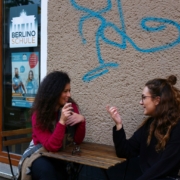Why should I learn German? 15 typical situations in Germany that will make you understand why
Several foreigners arrive in Germany without speaking a word of the language. To those thinking that they can live happily without any knowledge of German, you’ll soon think twice.
We put together a list of 15 situations that exemplify why you need, and should want, to learn German when in Germany.
1. At the pharmacy
To avoid having to open your mouth and “aaaah” at the saleswoman/man’s face to explain that you desperately need a spray for your throat. The pharmacist will be grateful.
2. To register in Germany
For all of those that wish that their Schufa (the document that states that you have no debts) stays immaculate and without shame.
3. At the bar
Because ordering a cappuccino or a latte, with the exact amount of milk or sugar, in perfect German is priceless.
4. Amongst friends
You’re looking for a new job. Your friends are concerned for you, they can feel that you’re one step away from packing your bags and heading back home…till when you’ll find yourself making orders for a table of 20 hungry and demanding people. The glory is tangible.
5. The meanders of German bureaucracy
Knowing the language of who will accept your request for the Hartz IV is surely something.
6. At the counter
When you’ll meet that particular cashier on a personal fight against mankind, you’ll know it. For who already has, how many times have you wished to be able to face her/him and respond adequately?
7. With your landlord
It is indispensable to make him understand that with you, the shark games won’t work. You are no amateur and it is important to put things straight immediately. In German.
8. With the Brazilian wax-lady
It might be kind of easy in Spanish, but in Portuguese it’s a different matter. To be able to speak German as a glowing wax lady from Belo Horizonte is covering your bikini area with incandescent honey will definetly come in handy.
9. With your colleagues
In particular during the first days of your new job when you’ll all be heading to the Kneipe for a cold beer, you surely don’t want to find yourself without words whilst everybody else is happily chirping their order.
10. During a job interview
Not every company demands you to know German, in particular the young-hip start ups. Considering the salary that they will offer you, one would expect them to be very flexible. However, understanding what you’re signing up for, including but not only those tiny German ‘oh that doesn’t mean anything’ asterisks in your contract, will surely make a difference.
11. To surprise co-national tourists
Ever overheard an unpleasant comment on what you’re wearing or on your new hairstyle by part of a co-national tourist? That’s where the fun starts: express your disappointment in German, look at them severely, and conclude with a nice “I love my co-nationals!”.
12. To conclude important transactions
Your girlfriend can’t live with the hat she just saw at that stand in Alexanderplatz, yet the vendor won’t negotiate? Try in German. You’re not a tourist after all, and it’s guaranteed that you’ll walk away with a smile and a bargained hat.
13. To conquer that German boy or girl
You don’t necessarily have to be fluent. But everybody knows that there is nothing cuter than having a foreigner trying to get your attention with some, more or less correct, expressions in your own language.
14. To understand Berlin’s exotic menus
In Berlin to step out of the house and look for a restaurant or Imbiss that inspires you is like traveling the world in 80 steps. Yet, no matter how exciting this may be to all food lovers, be sure that when you’ll find yourself in front of that 101-dish menu written in a different language (whether it be Siam, Japanese or Lebanese-Arabic) you’ll be quite concerned. The explanation in German of the dishes however helps (and is particularly useful to avoid unpleasant surprises, such as finding out that your dish is covered in coriander).
15. To really integrate
To stop obsessing over those two Germans chatting in the ubahn, thinking that they are talking about you after a glance and a smile. Beyond the irony, to understand / kind-of-speak German in Germany (as much as for any other language in any different place) allows us to be aware, and not feel lost, in our surroundings. Is there really anything more important?













Leave a Reply
Want to join the discussion?Feel free to contribute!